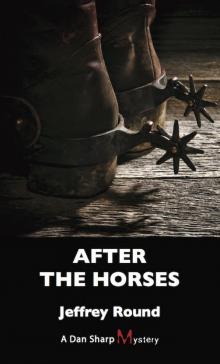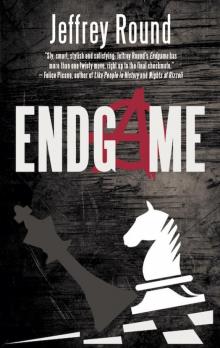- Home
- Jeffrey Round
A Cage of Bones Page 2
A Cage of Bones Read online
Page 2
Warden put his hand on hers. “I have thought about it. It’s what I need to do. I know that.”
“How long will you be gone? A week? A month?”
He shrugged. “I don’t know.”
“Will you be back in time for school next fall? Maybe if you take a break now you’ll be ready to settle down and study when you come back.”
“Maybe.”
She shook her head at the unknown chasms opening before him, preoccupied by bewildering thoughts and mothers’ worries. “I knew you’d go one day. I always knew it.”
Her emotions turned quickly. She stepped outside of her anxiety. Somehow she’d got beyond those minor peaks, like new snow blanketing old, covering the emotions with a fresh layer of hope for this son with the flush of excitement spreading across his face.
“Does your father know?”
“Not yet.”
“He’ll be upset when he finds out you want to leave school. It was his highest hope for you. You really didn’t like it very much, did you?”
Didn’t. It was already of the past.
“There’s still plenty of time to be an engineer, Mom.” He hugged her. “Or anything else I choose.”
Warden’s father sat next to the gas fire in his den. He put down a book as Warden entered, folding his hands across his belly. A cat padded around the room looking for a place to sleep, settling in a corner away from them.
“Hello, Ward. How’s the schoolwork going?” the deep voice asked.
Warden stood in the doorway. “Fine, thanks, Dad. Do you have a minute?”
“Of course—come in.” His father indicated a decanter on the sideboard near the shelves of books extending along the wall. “Would you like some sherry?”
“No, thanks.”
“This looks like it’s going to be a father-son talk. Well, have a seat. What have I done?”
Warden stayed standing.
The older man regarded his son, waiting for him to speak. Suspended from the ceiling behind the desk was a set of model airplanes he and Warden had carefully constructed when Warden was eight. They spoke of hours of cautious deliberate labour, Walter guiding his son each crucial step of the way.
“I’ve…come to ask your permission to leave school and go to Italy.”
Walter studied his son’s face. “I don’t really know what to tell you,” he said at last. The voice was brusque, but not off-putting. “You want permission to leave school—since you paid for it, I can’t tell you not to.”
He paused, balancing his thoughts with what he might have hoped to hear in such a situation.
“Do you think you’ll find things easier or better in another country? Or are you simply going in search of excitement? I think on the contrary you’ll find it more treacherous in a land other than your own.”
Warden tried to explain how he felt about school and how the offer from Sr. Calvino had made him aware of the opportunity he might be passing up.
“I feel there’s something out there for me and I’ve got to find out what it is.” He was aware how pitifully naïve that would sound to his father.
“For you to leave school and go off in search of adventure is the last thing I’d wish for you. My own father, who you never met, was a drunkard and a petty criminal. I spent every ounce of energy I could to educate myself so I would lead a decent life and not turn out like him.” He paused for a moment, as though a memory had unsettled his thoughts. “Education is the one thing that will lead you up in this life, Ward. It’s the thing that will bring you what you want.”
They remained—the father sitting and the son standing—like Phoebus and Phaëton, the boy asking for the one thing he must have, the older man wishing he would ask for anything but the freedom to choose that one thing.
“What if my happiness depends on it, Dad? If I stay through another two-and-a-half years of school and became an engineer I still might not be happy.”
“Happiness isn’t everything you think it is right now. You won’t find that out till later, unfortunately. I just hope it’s not too late.”
Walter looked at his son. What did he know of this boy, barely a man, standing before him asking for his freedom? No more than his own father had once known of him, thinking that to beat a boy into submission would obscure the corners of the unknown from his personality, driving the shadows from the face of fact.
“Don’t think I don’t have your happiness at heart, Ward. The proof is in my fear for you. Look around you. Whatever is most precious is to be found right here, at home. You have everything you could possibly need in front of you.”
Warden looked at the smooth walnut bookshelves extending floor to ceiling. He thought of the thick banisters running along the stairwell and the staid Palladian design of the house itself—all lending an air of peace and security to the family home.
“I won’t say ‘no’ to you,” his father said, “but I ask you to choose carefully. The years go fast enough of their own accord; the trick is to hold them in.”
Walter thought the conversation was over. He hoped his son would go away and think about what he’d said and, if he were truly wise, change his mind. Warden remained standing before his father, whose life was solid and secure. He belonged there in the home he’d created for himself. Warden’s course was just begun.
“I want your permission, Dad.”
Walter looked at the young man standing before him. The bough had broken.
“Even when you were a boy you always did exactly what you wanted, no matter what you were told...and sometimes it turned out to be the right thing. All right—I’ll leave you to your choice and hope your plans work out for you.”
Warden sprang to the door, pouring out his thanks and delight to his father before flying off. Walter looked after him for a moment, then reached for his book and settled back into the chair by the fire.
Despite Warden’s maturity, his parents’ concerns weren’t altogether unfounded. Both Walter and Beatrice were aware their children had been raised in a gilded cage, albeit one of modest proportions. Warden’s social experience was average for a boy just turned twenty, raised on MuchMusic, Letterman and the generic wisdom of Macintosh computers. His sexual score card, though, even self-admittedly, was somewhat less impressive.
In high school he’d been the first love of a dozen adoring schoolgirls. At university he was popular with his classmates and within a week everyone knew him by name in the dormitory where he lived. Other boys sought his advice on love matters as much as on the tedium of schoolwork, though they seemed to Warden more capable than him. Girls flirted with him openly during class lectures, hinting they were willing to be intimate with him, though he never took up their transparent offers.
Except for the odd bit of inquisitive kissing in junior high school, he’d never been intimate with anyone. The only time he experienced anything like it was with another boy in his first year chemistry class. From the first, there was an undeclared attraction between the two boys, though neither ever spoke to the other.
Warden and the other boy—John—always sat in close proximity during class. To anyone watching, the pairing would have seemed almost accidental, like the casual attraction of sympathetic elements. Occasionally, Warden would glance up at the blonde seated languidly at a nearby desk. At the same time, as though bored with the lecture, John might turn and catch Warden’s eye, lingering for just an instant before looking elsewhere. That was all.
One night Warden dreamed he stayed late after class and he and John were the only ones there. They talked and laughed openly together as they’d never done in real life. When it came time to leave, they walked up the street arm-in-arm until they reached a large dark building. John stopped and looked about.
“Where are we?” Warden demanded.
“African Studies,” John replied in a mysterious undertone, as if that told all. He smiled. “We can go in back.”
Warden looked up at the building, unsure of what it held.
“It’
s safe,” John added in a conspiratorial whisper.
Warden wasn’t sure why they were going behind the African Studies building or what it was safe for, but he followed like a puppy on a leash. In the dream, it was nearly dusk. The other buildings were hidden behind tall trees. A thick carpet of leaves covered the ground. John turned to face him. Warden could hear his soft breathing in the liquid darkness.
Warden reached out to John, who lifted his hands at the same instant as though in a mirror. Their palms touched and Warden felt a jolt of energy. His body expanded, streaming outwards as it divulged secrets of exquisite pleasures: of beautiful birds nesting on white cliff tops, the arcane knowledge of moonbeams and blizzards, and the joy of swimming naked at midnight. Warden fell headfirst onto a leaf-blanketed lawn, oblivious to everything. He lay there a long time watching the planets whirl in their mysterious circular configurations to the sound of tinkling glass and dying leaves.
The day he left, it was cold and clear. It had snowed lightly during the night. Beatrice came downstairs in her nightgown and slippers. She sat perched on the front step, as though that were the farthest bounds of safety of her world. She watched as they took his luggage to the car.
She hugged him. “Please be careful, Warden,” she said. “We’ll miss you, so write. Have you got everything?”
“Yes.”
“Money?”
“Yes.”
“Have you packed enough clothing?”
“I think so.”
She released him. He moved to the car door.
“Warden…”
He turned to her.
She wanted to say something—to warn him against something—but what? The nebulous, unformed dangers that haunted a mother’s mind. And life itself, she imagined. She smiled at the handsome young man standing patiently before her. It seemed as though he were someone else now.
“Bye, Mom—see you sometime. Try to get out a bit.”
“Goodbye, Warden—send us some pictures of you when they show up in the magazines.”
Unknown countries floated below him now. He tried to imagine what they were. He was waking with the taste of rich hot coffee and a somewhat premature celebratory glass of champagne he’d ordered to the surprise of a sleepy-eyed stewardess. This was followed by a piece of bitter chocolate, affecting him with the collision of competing substances in his bloodstream. At that altitude he felt an enviable freedom.
It was in this state that he caught his first glimpse of the Alps. Jagged peaks brooded among broken clouds, resurrected out of their gothic existence. Sun glinted on powdery crests as the plane’s shadow rolled across a sea of silver and black. It was as though the rag ends of creation had been dispersed over a staggering emptiness, ringing the horizon in a colossal granite disguise.
A stewardess wandered down the aisle picking up empty trays and discarded napkins. Outside, the sky seemed to be lowering.
“Where are we right now?” Warden asked as she picked up his tray.
“We are almost in Milano,” she said. “Ciao, bello. Welcome to Italia!”
2
At customs, the lethargic guard didn’t bother to feign interest when Warden offered his passport. He asked the duration of Warden’s stay and whether he intended to work while in Italy. Warden was about to say “yes” then thought he might require a work permit. Perhaps the agency had arranged one. Was his name on a list somewhere? If so, Calvino hadn’t mentioned it. In any case, he didn’t want to have to explain all this to the guard whose recalcitrant cap had crept down over his forehead and whose accent was barely decipherable. Warden hesitated then finally said, “No.” He heard a quiet thunk as his passport was stamped and returned.
The airport lobby was nearly empty. He purchased a city map at a kiosk then picked up his bags and walked to a bus stop where others were waiting. The bus arrived and they all climbed aboard. As it pulled onto the highway, Warden turned to watch the tail end of the Alps go by, the sky blue and seamless beyond.
The bus driver was a garrulous man given to shouting the names of landmarks in a tortured though not unrhythmic English. He turned the radio up full to provide a background for his animated narration. Outside the window the landscape was full of light, imbued with a magical richness common to foreign lands.
Across the aisle, a dark-haired girl smiled at Warden. “Hi! Where’re you from?”
“Toronto.”
She sighed. “I’m from Boston. It’s been so long since I’ve been home.”
The pack under her seat bulged. She wanted to know what was happening “back home.” He told her what he could recall of current North American domestic affairs. She seemed lost in nostalgia. When the ride ended outside a massive stone fortress in the middle of the city, he said goodbye and debarked with his bags.
From the station, a driver took him to the address scribbled in his date book. The cab pulled up outside a four-story stone building. Warden paid and got out. He heard voices coming from inside. American voices. Footsteps pounded down the stairs.
“What’s happenin’, dude?”
Six or seven energetic young men in sweaters and jeans bounded past him through the doorway and scattered like minnows. Warden shouldered his bags and climbed the flight of stairs. A small boy crouched on the landing with a plastic truck, zooming it back and forth while making sounds appropriate to small boys playing with trucks.
“Ciao,” said the boy, looking up briefly.
“Ciao,” Warden said, and continued upwards.
On the next landing he came to a desk sporting a rack with dozens of pigeon hole slots. The wall behind it was covered in a collage of four-by-six cards featuring the eager faces of dozens of young men like the ones he’d just passed. Warden set his bags down and rang a bell. A dark-haired woman emerged from a doorway, drying her hands on a towel. She scrutinized him without coming to any conclusion as to his presence before her.
“Ciao.”
“Ciao,” he said. “Do you speak English?”
“Yes. How may I help you?”
“Is this the Albergo Sirtori?”
“Yes.”
“I’m from Maura’s Models. Sr. Calvino sent me.”
Her face registered scepticism as she flipped through a register in search of something that might verify his statement. She looked up.
“You are Sr. Fields?” she asked cautiously.
“Yes,” he said.
“May I see your passport, please?”
He handed over the document.
“We were expecting you tomorrow,” she said, frowning as she studied it. “Sr. Calvino is not very precise about his arrivals.”
Warden shifted nervously. He wondered what he would do if she told him to come back in the morning.
She looked up. “Never mind. It cannot be helped,” she said, her voice softening. She offered him her hand. “I am Irena. Come—I will show you your room.”
She scooped a key off its hook and led him down the hallway past rows of numbered doors. He heard music coming from some of the rooms.
“I have put you in with another American boy. You will have to share for now. His name is Jimmy. He has gone to Firenze for a show, but he will be back tomorrow.” She clucked her tongue and looked him in the eye. “There are no girls allowed after 10 o’clock in the rooms.”
She opened a door and switched on the light. The room was small and unadorned, but clean. Two twin beds took up most of the space. A set of wooden doors opened onto a balcony. Warden thanked her and put down his bags.
“I hope you enjoy your stay,” she said simply, and went out.
Warden examined the room. A night table divided the beds. At the far end, a sink and portable wardrobe took up most of the space. A suitcase peeked out from under a collection of shirts hung hastily beside an assortment of dress pants. A pair of worn running shoes waited expectantly at the foot of one of the beds. Discarded T-shirts were draped everywhere.
On the table sat an inexpensive lamp. A book of Italian
phrases, a Bible and a romance novel leaned against it. A handful of pop music cassettes lay scattered nearby, some of his favourites among them, he noted, while an ashtray on a lower shelf contained a smattering of unusual coins. Beside this, a stack of modelling cards presented a freckled face with a friendly grin. The name “Jimmy Caitlin” ran across the top and the logo of a famous New York agency on the bottom. Real American stock, Warden mused.
Following his absent roommate’s example, he unpacked and stored his deflated bags in the wardrobe. He stepped out onto the small balcony overlooking a courtyard in the low light of afternoon. Rooftops connected to neighbouring buildings with courtyards of their own. By summer they would offer an abundant greenness. Right now the branches were barely in bud, red tips of hope.
He stared at the view, wondering what lay concealed behind it waiting to reveal itself. He wanted something to offer a hint of why he’d travelled so far. It had all happened so fast. It wasn’t hard for him to believe he was there. What was hard to believe was that this place was any different from the one he’d just left.
Warden stepped back in and closed the doors. He washed his face and hands at the sink then lay on the bed, staring up at the cracked ceiling and trying to recall the events that led him there. His eyes closed. When he opened them again the light at the window was almost gone.
The air was cool where it drifted in from an open window. He got up and put on a sweater then went out into the empty hallway. The aroma of fried garlic and onions met his nostrils. He heard children’s voices as he approached the reception desk. Inside a well-lit room, he saw the boy who’d greeted him on the landing earlier, now sitting at a table beside another boy and a girl. They waited expectantly as Irena ladled a steamy broth into bowls. He passed the simple gathering and continued down the stairs.

 After the Horses
After the Horses Lion's Head Revisited
Lion's Head Revisited Shadow Puppet
Shadow Puppet Lake on the Mountain: A Dan Sharp Mystery
Lake on the Mountain: A Dan Sharp Mystery The God Game
The God Game Dan Sharp Mysteries 4-Book Bundle
Dan Sharp Mysteries 4-Book Bundle P'town Murders: A Bradford Fairfax Murder Mystery
P'town Murders: A Bradford Fairfax Murder Mystery Endgame
Endgame A Cage of Bones
A Cage of Bones